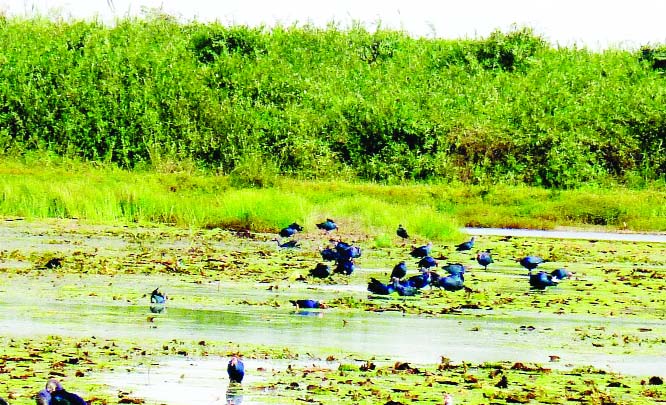
Md Mosabbir Ali, Kulaura :
Migratory birds have started flocking to Hakaluki Haor, the biggest lake in the country, delighting visitors with their chirping and fluttering. But arrival of migratory birds in the Haor this year is decreasing than last two survey year 2017 and 2018.
After the survey report published on Wednesday afternoon. Organisers told this correspondent that about 37,931 birds of 51 species were counted during a survey done on two days (26th and 274th January).
The number was 45,100 birds of 44 species were counted in last year, 58,281 birds of 50 species in 2017 34,264 birds of 56 species were counted in 2016 and 21,631 surveys survey year 2015.
Birds of different species have come earlier this year and their number is also decrease than last years, bird watchers said. Team led by National Coordinator of Waterfowl Census in Bangladesh and prominent bird specialist Enam Ul Haque conducted the survey.
Organised by Bangladesh Birds Club and IUCN. Sumon Alom a resident of Pusainagor village under Kulaura Upazila of Moulvibazar told this correspondent, fewer birds seen than last year. Migratory birds are not visiting the haor this winter because of the high water level of the wetland and as the forages that birds feed on remained submerged under water.
Bird specialist and a member of the survey team Bashir Ahmed after survey told this correspondent on Wednesday that they counted 37,931 birds of 51 species in 40 water bodies of Hakaluki Haor. It is lower than last two years.
He said, it is not specify as guest birds decreasing this year. Migratory birds are coming depend on environments. These are dead birds found at Balijuri Beel of Hakaluki Haor during the Waterbird Survey Program during 26-27 January this year. I guess they were killed by poison baits. Some journalists are known to me from Hakaluki Haor area (Kulaura, Juri, Barleka, Fenchuganj and Golapganj). One of the journalists recently has informed me that bird hunting is going on at Hakaluki Haor by poison baits this year and many people in the area are habituated to eat this type of poisoned birds. And i guess most of the birds are collected after their death.
Taking dead and poisoned birds is a matter of shame of the people around Hakaluki Haor. Local enthusiastic people should raise their voices against the ill habits of the local people. As a result migratory and resident birds will be saved and the health of Hakaluki Haor ECA will be good for us, he added.
Natural Resource Studies (CNRS) side officer Moniruzzaman Chowdhury told this correspondent guest birds avoiding Haor for increasing people in Haor area as bed effected for the guest birds. In this cause birds face food crisis. In this regards arrival of birds is decreasing, he said.
Friendly aquatic tree like Hizol, Koroch Boran, Murta is being planted in Chatalbil and Dohobil beels to create resting places for birds. But it is too little, he added.
Migratory birds have started flocking to Hakaluki Haor, the biggest lake in the country, delighting visitors with their chirping and fluttering. But arrival of migratory birds in the Haor this year is decreasing than last two survey year 2017 and 2018.
After the survey report published on Wednesday afternoon. Organisers told this correspondent that about 37,931 birds of 51 species were counted during a survey done on two days (26th and 274th January).
The number was 45,100 birds of 44 species were counted in last year, 58,281 birds of 50 species in 2017 34,264 birds of 56 species were counted in 2016 and 21,631 surveys survey year 2015.
Birds of different species have come earlier this year and their number is also decrease than last years, bird watchers said. Team led by National Coordinator of Waterfowl Census in Bangladesh and prominent bird specialist Enam Ul Haque conducted the survey.
Organised by Bangladesh Birds Club and IUCN. Sumon Alom a resident of Pusainagor village under Kulaura Upazila of Moulvibazar told this correspondent, fewer birds seen than last year. Migratory birds are not visiting the haor this winter because of the high water level of the wetland and as the forages that birds feed on remained submerged under water.
Bird specialist and a member of the survey team Bashir Ahmed after survey told this correspondent on Wednesday that they counted 37,931 birds of 51 species in 40 water bodies of Hakaluki Haor. It is lower than last two years.
He said, it is not specify as guest birds decreasing this year. Migratory birds are coming depend on environments. These are dead birds found at Balijuri Beel of Hakaluki Haor during the Waterbird Survey Program during 26-27 January this year. I guess they were killed by poison baits. Some journalists are known to me from Hakaluki Haor area (Kulaura, Juri, Barleka, Fenchuganj and Golapganj). One of the journalists recently has informed me that bird hunting is going on at Hakaluki Haor by poison baits this year and many people in the area are habituated to eat this type of poisoned birds. And i guess most of the birds are collected after their death.
Taking dead and poisoned birds is a matter of shame of the people around Hakaluki Haor. Local enthusiastic people should raise their voices against the ill habits of the local people. As a result migratory and resident birds will be saved and the health of Hakaluki Haor ECA will be good for us, he added.
Natural Resource Studies (CNRS) side officer Moniruzzaman Chowdhury told this correspondent guest birds avoiding Haor for increasing people in Haor area as bed effected for the guest birds. In this cause birds face food crisis. In this regards arrival of birds is decreasing, he said.
Friendly aquatic tree like Hizol, Koroch Boran, Murta is being planted in Chatalbil and Dohobil beels to create resting places for birds. But it is too little, he added.

